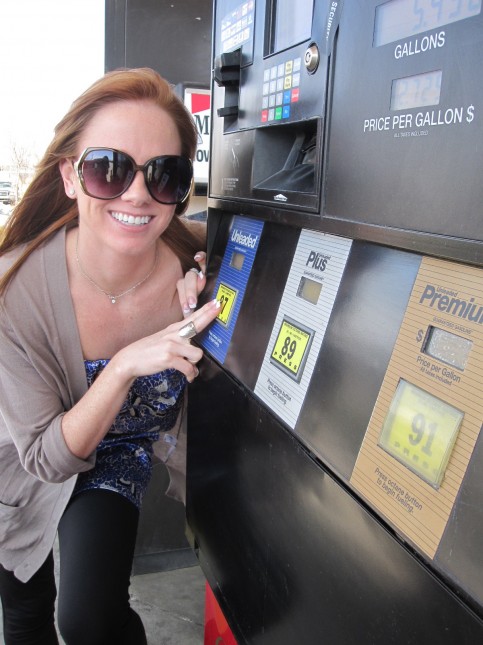
Eenie Meenie Minie Moe
When you pull into a gas station, you use the same ‘level’ of gas each time. Have you ever wondered why there’s so many to choose from? Have you ever wondered what it all meant?
Well, a young gentlemen tweeted me, asking this very question. And after speaking to one of my service writers here at McCarthy Chevrolet, I decided to share what I learned with everyone.
The different numbers represent different levels of octane. Eighty seven is the lowest octane level and it goes up from there — 87, 88, 89, 91, 93 being the most common. So, what does that mean? Well, 87 will burn slower than a 91. But 91 will be hotter, creating more of a combustion, which causes the motor to run faster — even better.
Here’s how Scott Bremer explained it to me: Take a normal piece of paper and light it on fire. It will burn at a slow rate (like an 87). Take flash paper and light it on fire. It will burn at a much faster rate (like a 91). Ah!
So is the higher octane worth the price? Well, high performance vehicles will specify a higher octane level. Just look in your owner’s manual or ask your salesperson. But, if you’re driving an everyday vehicle, it really doesn’t matter all that much which fuel you choose.
Do you fill up with regular or premium? Can you feel a difference in performance?

My service buddy, Scott!



8 Comments
Great information, Lauren (and gorgeous smile).
Well, thank you! (and thank you)
I have been riding motorcycles and driving 4 cylinders for almost ten years, so I’m always looking to squeak out a little more performance from my toy- er, vehicles. In my Yamaha V-Star I put the high 93-octane because it will ride rough with the 87-octane. At KCIR (the local dragstrip) I tried putting 111-octane racing fuel into a stock Pontiac Grand Am but didn’t notice a significant power gain than normal.
Call me boring, but I’m going to go with car-tuning 101: higher octane fuels will provide more power when combined with higher volumes of air to maintain air-fuel ratios. Performance cars feature improved air intake systems to actually make use of the higher octane to push out the power (improved intake manifolds, cold-air intakes, blowers, turbochargers.) I feed my stock Civic 87-octane (from QT – no exceptions!) because it can’t suck in the air necessary to use the high grade stuff.
Hope this helps. And I love the site Lauren. – Tim
Hey Tim,
I appreciate any advice & tips you have for me! I love learning new stuff!
Thanks so much. 🙂
~Lauren
In a non-specialized tuned car higher octanes will not benefit you one iota. It has nothing to do mathstud with air flow levels. More power when combined with higher volumes of air in a constant air to fuel ratio means you are burning more fuel – thats what gives you more power, not the octane.
Lets check what the American Petroleum Institute say about octane.
http://www.api.org/aboutoilgas/gasoline/gasoline-octane.cfm
paragraph #4
“Ordinarily, your vehicle will not benefit from using a higher octane than is recommended in the owner’s manual.”
From Wiki –
Octane rating does not relate to the energy content of the fuel (see heating value). It is only a measure of the fuel’s tendency to burn in a controlled manner, rather than exploding in an uncontrolled manner. Where octane is raised by blending in ethanol, energy content per volume is reduced.
I think I will take their explanation
To Scott:
To make sure I understand you, you’re saying:
“More air + more fuel = more power”
as opposed to my claim of:
“more air + higher octane fuel = more power”?
Thank you for clarifying. I suspect you know the topic better than I do.
I did a little more digging and found the following the following article:
http://www.corvettefever.com/techarticles/corp_0402_corvette_fuel_octane/index.html
And specifically the following line – “An engine’s octane requirement is directly related to the engine’s compression ratio…”
I didn’t take into account the fact that Corvettes and turbo’d four-bangers run higher compression (more air pressure) than your daily driver. It then said that with higher compression it needed the higher octane to combust safely.
The way I had understood it was:
“more air + higher octane fuel = more power”
Is this a better explanaition?
More air (via forced induction) = more air pressure (Compression);
Higher Compression (which needs high-octane fuel) + More Fuel = more power.
(So much for a simple answer!)
-Tim
Tim,
Higher octane takes more heat to burn – which causes more compression – which equals more power.
You are correct!
Nothing seems to be simple these days! … haha
~Lauren
who ever told you higher octane burns hotter needs to go back to school. 87 oct, has about 150,000 btu per gallon
93 has about 140.000 btu,s per gallon, 93 octane burns slower and cooler, if it had a fast burn it wouldnt drive the piston back down very effeciently,
octane does not cause compression,
~bob